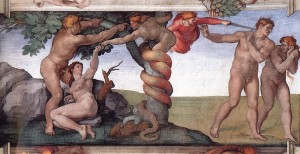Then God said, “Let us make man in our image, after our likeness ….” So God created man in his own image, in the image of God he created him; male and female he created them.” [Genesis 1:26-27]

 Michelangelo’s Fall and Expulsion of Adam and Eve, 1510.
Michelangelo’s Fall and Expulsion of Adam and Eve, 1510.
Fidelity and Love
Inscribed on this card are these words: “Fidelity and love are what our hearts long for.” The card was given to us by a French Missionary to Africa, Fr Dominique Arnauld, on our first meeting in Leuven, Belgium. Intuitively, he knew that for a married couple, fidelity and love underlie the core values of our existence.
They symbolise the yearning deep in our human souls. Wherever we may be spiritually, whatever we may have done in life, and whatever we may be planning on doing in life, deep down, we are all yearning for fidelity and love. Why? Because our Creator-God desires fidelity and love. God has made us for fidelity and love. We are pre-programmed to desire fidelity and love.
We remember once reading a report on an experiment conducted by an American university English Literature professor. In a simple survey amongst his class of young American men and women, he invited them to write down the top two qualities they wished most to see in their future spouse. The answers that came back somewhat surprised the professor. Even though certain qualities varied, fidelity featured in every answer. In a post-modern society that treasures personal freedom above all else, and a culture that is easily characterized as hedonistic, it does come as a surprise that fidelity tops the scale of desired values in a future spouse amongst the American undergraduates.
We all value faithfulness as a deeply committed devotion. I will be there for you. For better or worse. For richer or poorer. In sickness and in health. These are the treasures we long for, the ones that make our lives rich beyond compare, no matter what our circumstances and how horribly inadequate we may be in keeping them ourselves.
Our Patch of Grass
Married life is the patch of grass given us by God. Married couples can proudly display their slogan: “We are married people!”
- Married life is a gift from God!
- It is our calling in Christian life!
- Married life is our call to holiness!
- It is our way of discipleship!
- It is the patch of grass given us by God!
- God wants us to feed well on our patch of grass!
- It is the will of God for us.
And yet, we are confronted by horrendous divorce statistics in all modern societies, and there is every indication that the divorce rates amongst Christians are as scandalous as those of non-Christians. What does the Book of Genesis have to say about this?
A Penitential Scripture
In this area of reflection, the first three chapters of Genesis ought to be treated as one unit. When we read them right through without pause, there is an inescapable and stunning impression that the narrative moves very fast indeed.
- The first chapter recounts the first creation story in which God created the universe in six days and rested on the seventh.
- The second chapter turns to a second creation story, concluding on the gift of man and woman to each other in community, setting off on a new life on their own away from their parents. Realising that it was not good for the man that He had created to be alone and so desperately in need of community, God created the woman. Notice the jubilation when the woman was brought to him: Alleluia, praise the Lord! Thank you, thank you, thank you Lord! For “this at last is bone of my bones and flesh of my flesh.” And then they dashed into the church and made their mindless promises to treasure each other and all that, till death them do part. The marriage certificate was signed, sealed, and delivered in no time. They jumped into bed and the two became one-flesh.
- And then we turn the page to get into the third chapter, and at once all hell broke loose. Things fell apart. The centre could not hold. The great Fall had set in. Before the ink on the marriage certificate was dry, the avowed couple of one-flesh was heading to the divorce court. The speed with which the fall followed jubilation was quite stunning in a quick reading of Genesis chapter one through chapter three.
What happened?
What happened may be traced to one single point, namely, humanity freely and willfully choosing to go against God’s instructions. And then, a litany of consequences like fallen dominos came tumbling down.
- In Genesis 1-3, what God created was good/ very good, but left in human hands, things quickly turned bad.
- Sin was first and foremost, an estrangement from God upon the free choice of humans.
- Genesis teaches the fundamental lesson about sin: We are estranged from God before we are estranged from each other.
- Estrangement from God in turn led to estrangement from fellow humans.
- Praise for the divine design quickly transformed into a complaint and a curse — “bone of my bones and flesh of my flesh” degraded into “This woman...”
- Jubilation over the gift of communal living became a curse as the two-in-one-flesh was torn asunder – “she gave me to eat.”
- Gratitude for God’s gift of partnership degenerated into a veiled complaint against God — “This woman you gave me…”
- Hence, humanity began the habit of blaming all and sundry for human woes except facing up to one’s own failures.
- Banishment from the Garden of Eden followed suit.
It is then immensely helpful to see the first three chapters of the Book of Genesis through the interpretive lens of French philosopher Paul Ricoeur [1913-2005] who reads the story as essentially a piece of penitential writing. Through that lens, we now comprehend the story of the Fall as penitential in spirit, told by the inspired author:
- to say sorry to God for spoiling the order and beauty God gave us “in the beginning”,
- to acknowledge that what God gave us in the beginning was “very good”, but it is we who have spoiled things, because of sins,
- to see clearly that it is human sins that break the relationship with God,
- to comprehend the theological truth about sin being first an estrangement from God in vertical relationship before the breakup of the “one flesh” in horizontal relationship,
- to stop blaming God for the woes in society and in our lives,
- to assume responsibility for our own mistakes,
- to remember again, what God has given us, and
- to try again and do better.
Mother Church has got it right in one crucial respect. Whenever the people of faith come together for communal worship – that memoria service [which is what the celebration is about in the first place] of what God has done for us in Jesus Christ – we corporately [as the ecclesial Body of Christ] begin together, but with every person in that Body individually, acknowledging one’s sins or complicity to sins. In clear response to man’s [Adam’s] sinful refusal to admit his own sins in Genesis, and in keeping with the penitential spirit of the inspired author, that acknowledgement must perforce be owned up and uttered individually. Hence,
- I confess to almighty God, and to you, my brothers and sisters, that I have sinned through my own fault, in my thoughts and in my words, in what I have done, and in what I have failed to do; and I ask Blessed Mary, ever virgin, all the angels and saints, and you, my brothers and sisters, to pray for me to the Lord our God.
We recall in this context the words of William Temple, the Anglican Archbishop of Canterbury of the 1940s, who said: “The only thing of my very own which I contribute to redemption is the sin from which I need to be redeemed.”
With that in mind, estranged couples can begin again. They can unlearn many mistakes and begin their journey afresh as they grow and mature in fidelity and love. They will confront myriad issues. We imagine the following three for starters.
First, there shall be no finger-pointing. There shall be no attempts to shove away responsibilities and to place blames at others’ doorsteps. Instead, each spouse shall humbly own up his or her faults and failures, repent, say sorry, and seek reconciliation.
Second, the couple can return to the beginning of it all, to the Book of Genesis and recover the two fundamental principles taught in the first creation story, namely, fundamental human dignity and fundamental human equality, regardless of genders. These are crucial for the understanding of the human person, a subject on which the immediate past and current Catholic popes have rendered tireless attention. Pope John Paul II’s strong legacy is his emphasis on the importance of the human person. All people have inherent dignity simply because they are born, and so must be respected. Pope Benedict XVI stresses that the human person is the heart of peace. Peace is promoted by respecting the inalienable dignity of the human person created by God. Peace is not just a gift, it is essentially a task. To get started on the journey of peace, respect people! Do not presume any superiority. After all, Genesis 2 reminds us all that we are made from ashes and to ashes we shall return.
Third, as forgiveness creates the family we all believe in and yearn for, the couple can sober down, listen, and live this counsel from Our Lady of Naju, South Korea:
- Do not criticize or judge others, but convert your heart to God. Families are sick. Sanctify your family by loving one another. Never blame others, but always blame yourself only. Those who accept my message of love will experience a renewal of their souls.
This advice, ascribed to our Blessed Mother, essentially reiterates the advice of the Lord to take the plank out of one’s own eye, before removing the speck from someone else’s (Matthew 7:5). It resonates deeply with the penitential spirit that we saw in Genesis 1-3, and brings us back to the heart of the Creator.
Copyright © Dr. Jeffrey & Angie Goh, October 2012. All rights reserved.
You are most welcome to respond to this post. Email your comments to us at jeffangiegoh@gmail.com. You can also be dialogue partners in this Ephphatha Coffee-Corner Ministry by sending us questions for discussion.
